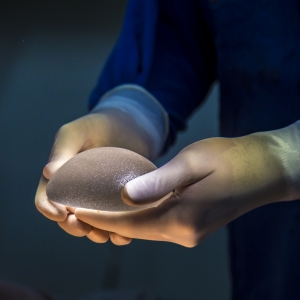By TOAN NGUYEN, MD

Breast augmentation using breast implants is one of the most common cosmetic procedures in the United States and in the world.
Women who have undergone a mastectomy for breast cancer or family history of breast cancer often undergo reconstruction with breast implants. The U.S. Food and Drug Administration (FDA) has identified an association between breast implants and a type of lymphoma called breast implant-associated anaplastic large-cell lymphoma (BIA-ALCL). This cancer is a type of non-Hodgkin’s lymphoma and is a cancer that originates from the immune system and not from the breast. Women with breast implants have an increased risk of developing BIA-ALCL, which occurs in the fluid or scar (capsule) surrounding the implant.
 BIA-ALCL presents as swelling or enlargement of the breast due to fluid accumulation. As of July 6, 2019, the FDA has recognized 573 cases of BIA-ALCL worldwide, including 33 deaths. One of the major companies that manufacture breast implants is Allergan. Of the 573 cases of known BIA-ALCL, 481 (84%) have been attributed to Allergan implants. Breast implants are made of different sizes and shapes. They can be saline-filled or silicone-filled. The actual material coating the surface can be smooth vs. textured. The vast majority of ALCL cases have occurred in patients with textured implants. On July 24, 2019, the FDA requested that Allergan recall its BioCell textured breast implants and tissue expanders from the market to protect patients from the increased risk of BIA-ALCL. Allergan complied and announced a worldwide recall of these textured breast implants.
BIA-ALCL presents as swelling or enlargement of the breast due to fluid accumulation. As of July 6, 2019, the FDA has recognized 573 cases of BIA-ALCL worldwide, including 33 deaths. One of the major companies that manufacture breast implants is Allergan. Of the 573 cases of known BIA-ALCL, 481 (84%) have been attributed to Allergan implants. Breast implants are made of different sizes and shapes. They can be saline-filled or silicone-filled. The actual material coating the surface can be smooth vs. textured. The vast majority of ALCL cases have occurred in patients with textured implants. On July 24, 2019, the FDA requested that Allergan recall its BioCell textured breast implants and tissue expanders from the market to protect patients from the increased risk of BIA-ALCL. Allergan complied and announced a worldwide recall of these textured breast implants.
Fortunately, BIA-ALCL has an excellent prognosis and is curable. Treatment consists of removing the implant and the capsule surrounding the implant. Patients with more advanced disease may require chemotherapy.
Currently, patients with breast implants who do not have any symptoms are not recommended to have the implants removed because BIA-ALCL is still considered uncommon. If you are unsure what type of implant was placed, contact your plastic surgeon’s office as they will often have the information in your record.
Most importantly, if you have breast implants and notice symptoms such as sudden pain, lumps, swelling, fluid collections, or unexpected changes in breast shape, including asymmetry, contact your plastic surgeon, primary doctor, or a healthcare professional familiar with BIA-ALCL. Earlier diagnosis and detection have better outcomes.
About the Author
Toan Nguyen, MD, is a Breast Surgeon with the nationally recognized Hollis Cancer Center and serves as Medical Director for Breast Oncology for Lakeland Regional Health. Learn more about our Breast Cancer Program or call 863.603.6565 to make an appointment with Dr. Nguyen.
